
At SpeedX Marketing, we are a leading provider of innovative IT solutions tailored to meet your specific business needs. With years of expertise and a team of skilled professionals, we offer cutting-edge technology solutions that drive growth and efficiency.

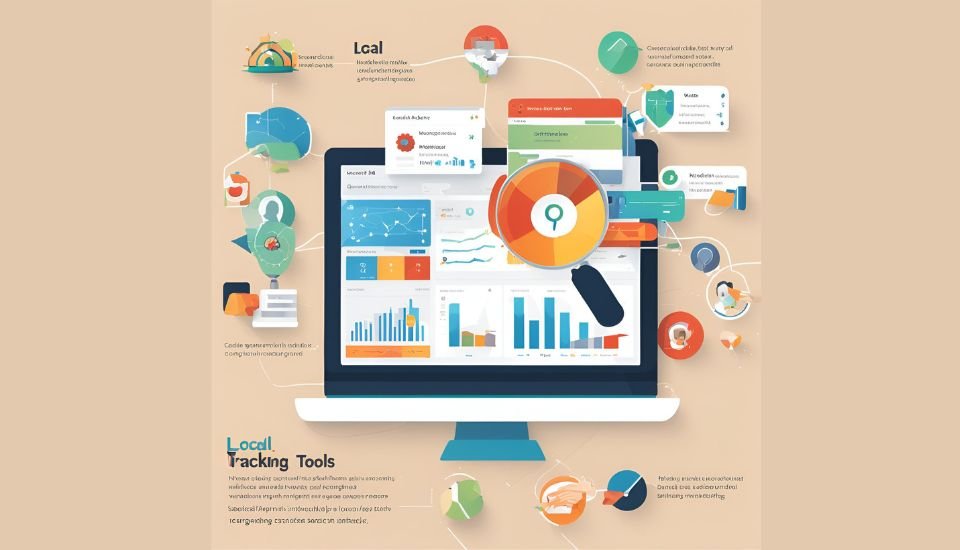


When people search for local services or products on Google, the Google Map Pack is one of the first things they see. It highlights the top three businesses that best match their search, making it the digital “front door” for local businesses. Getting your business listed in this top three spot is incredibly valuable because it gets the most visibility and clicks.
Studies show that businesses in the Google Map Pack receive the majority of attention from users. This means more people clicking on your business, calling you, or visiting your store. With your contact information, reviews, and ratings shown upfront, it’s easy for potential customers to find and trust your business quickly.
In this digital era where immediacy reigns, securing a spot in the Google Map Pack is not just advantageous—it’s essential for businesses aiming to thrive in the local marketplace.
Speedx marketing
However, merely having a GMB listing is not enough; businesses need to optimize it effectively to improve their ranking on Google’s search results.But the real question is: How can you rank your business in the Google Map Pack to get more leads and clients? Read on to learn how to improve your Google My Business ranking and attract potential customers to grow your business!
Imagine a bakery in your town seeing a surge in customers after claiming and optimizing their Google Business Profile. This isn’t just a happy accident – a case study by Web 2.0 Ranker showcased a multi-location brewery chain that achieved top rankings in Google Maps searches across their entire state. Their efforts resulted in more website traffic and calls, highlighting the power of local presence. It is just an example, and the following statistics will shed light on why ranking higher in local maps packs can be a game-changer for your business in your area. Get ready to learn as we sail through the numbers and discover how this tool can supercharge your local SEO game!
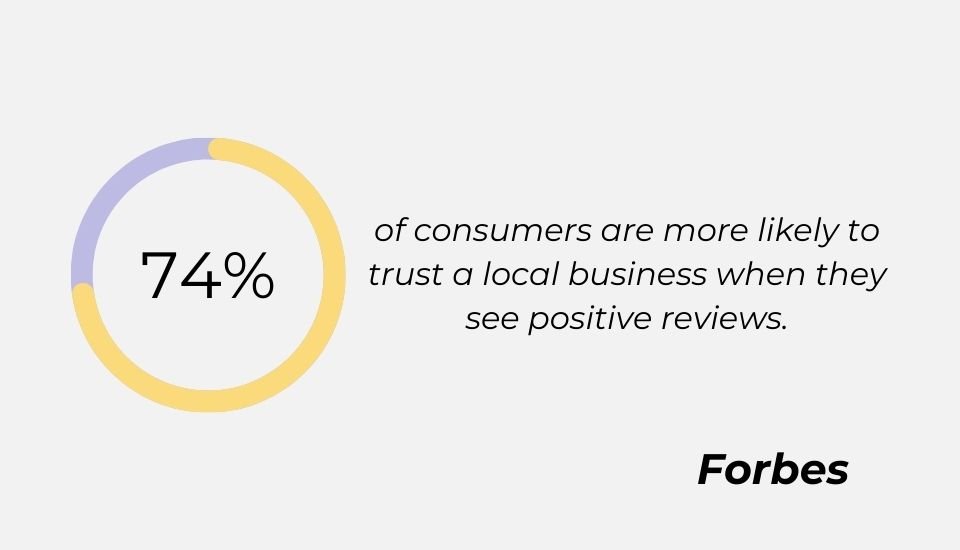
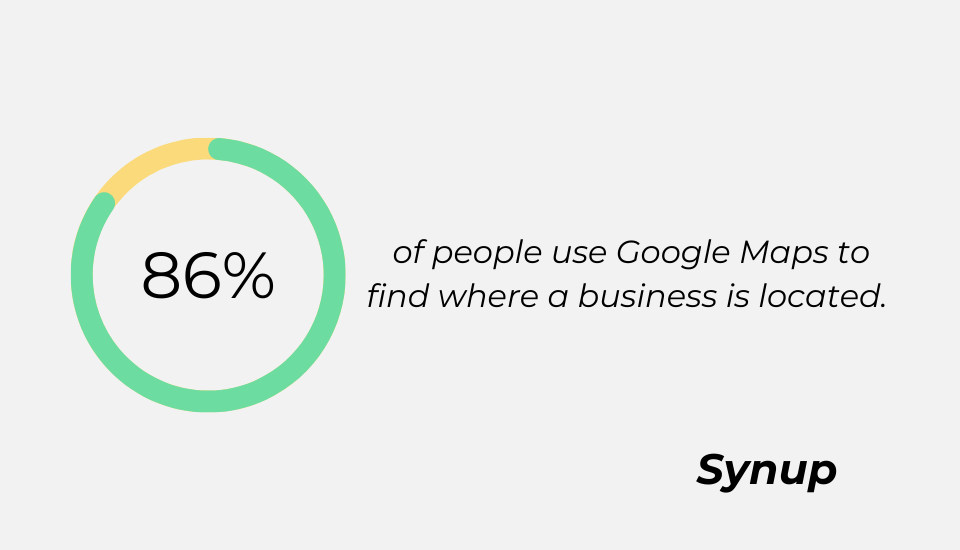
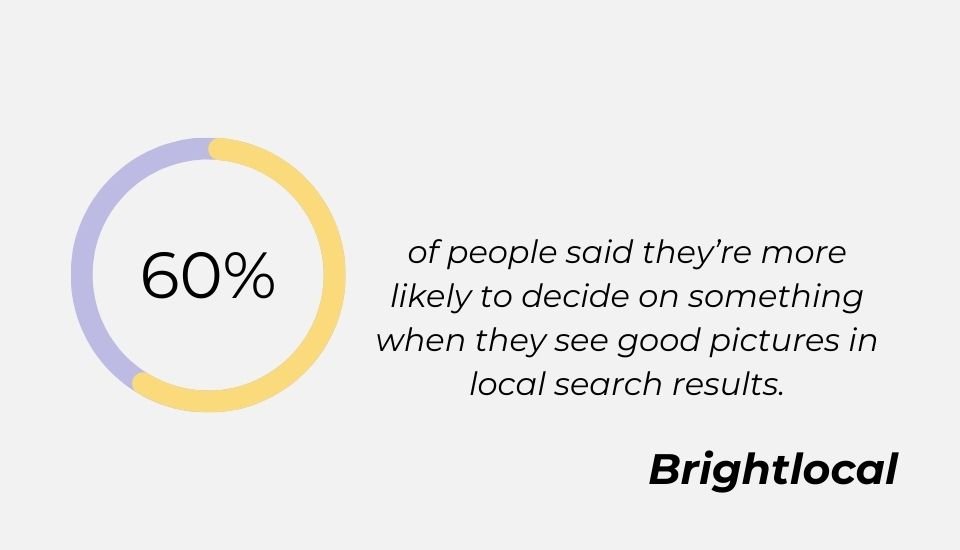
Map packs and local finder are features within Google’s search results that display businesses relevant to a user’s query based on their location. Map packs typically appear as a set of three prominent listings with accompanying maps, providing users with quick access to essential information such as business names, addresses, ratings, and reviews. On the other hand, the local finder offers a more comprehensive view, displaying a larger selection of businesses relevant to the search query.
Both map packs and the local finder leverage factors like prominence, proximity, and relevance to ensure users find the most suitable local businesses for their needs.
Speedx Marketing
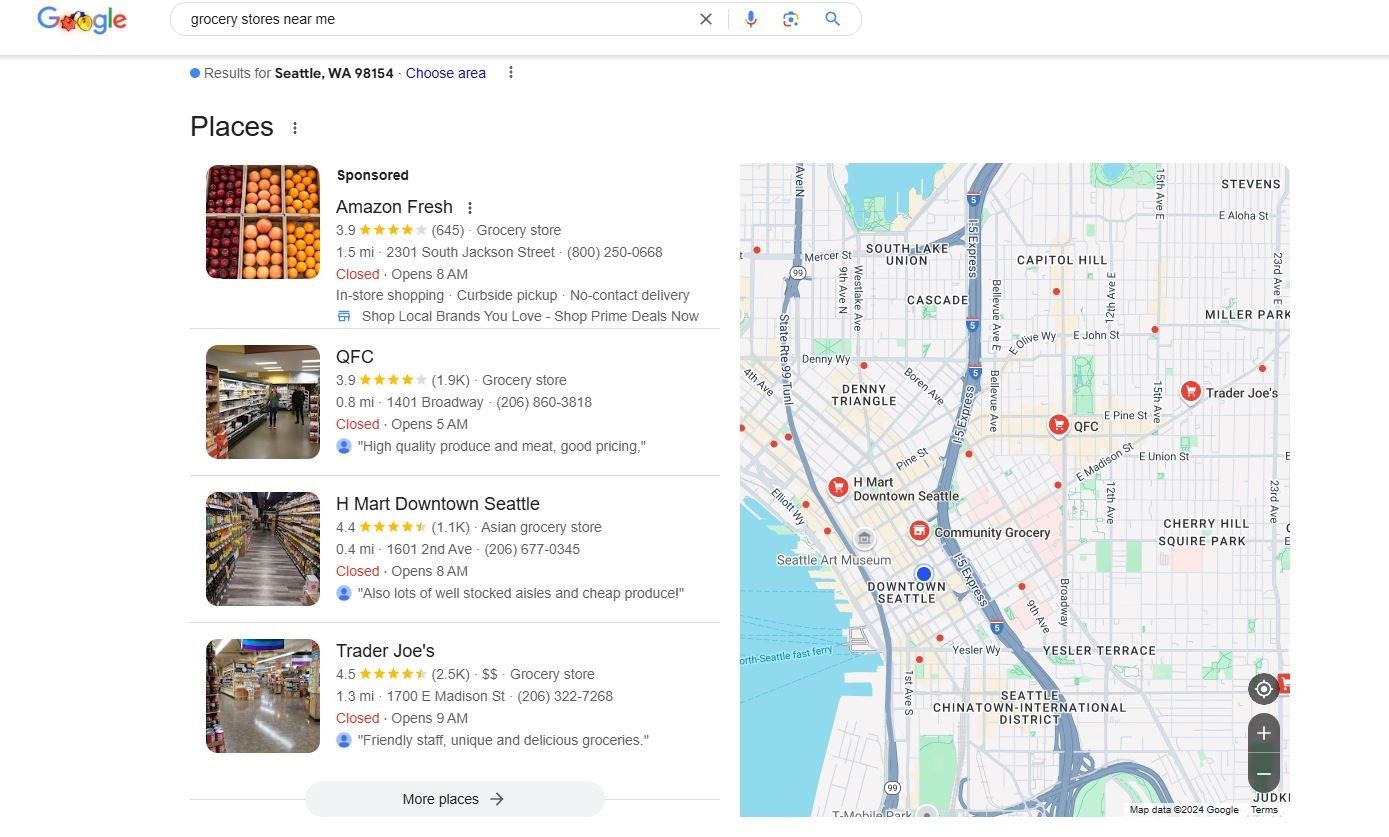
Google Business Profile previously Google My Business is a free tool provided by Google that enables businesses to manage their online presence across various Google platforms, including Search and Maps. It allows businesses to provide accurate information about their location, contact details, opening hours, and other relevant information. A well-optimized GMB listing can significantly impact a business’s visibility in local search results, making it easier for potential customers to find and engage with them.
The significance of a Google My Business listing extends to its impact on a business’s visibility in local search results. Google utilizes a sophisticated algorithm to sift through countless business profiles, prioritizing those that not only match the searcher’s needs but are also well-maintained and accurately represent the business. This means that the effort a business puts into optimizing its Google Business Profile directly correlates with its prominence in search results. In other words, an active and accurately maintained profile doesn’t just reach customers; it reaches the right customers at the time they are most interested.
In this digital marketplace, visibility is currency. For local businesses, leveraging Google My Business effectively means not only increasing their digital footprint but also positioning themselves strategically within the local consumer’s journey—from discovery to decision. Engaging with this tool is not just about being seen; it’s about being seen by those who are looking for exactly what you offer, at the moment they need it.
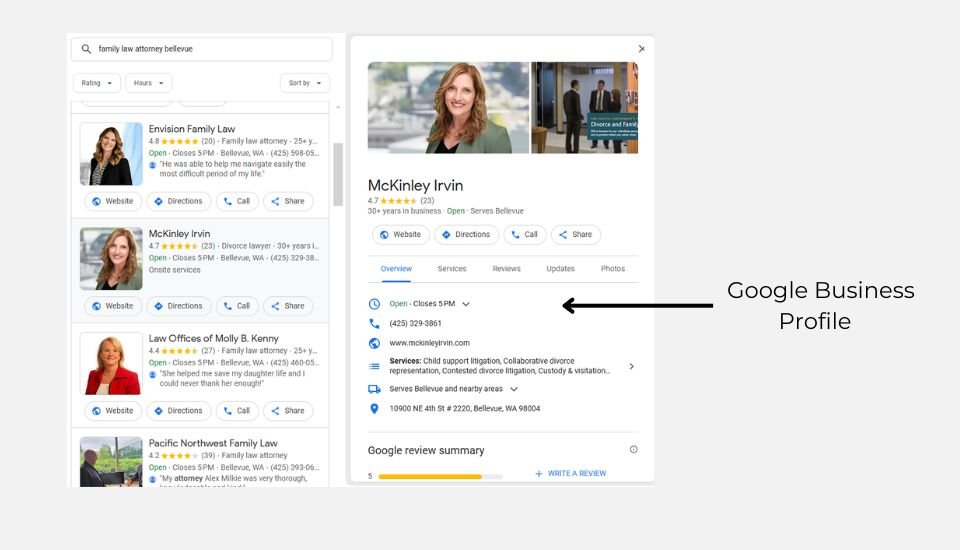
Relevance:
It’s essential for local businesses like plumbers to ensure their Google Business Profile aligns with search queries. Providing thorough information helps Google match the business with relevant searches. For instance, if someone searches for “reliable plumber in Los Angeles,” Google will prioritize plumbers with detailed profiles mentioning services, location, and contact information.
Distance:
Distance considers how far each potential search result is from the location term used in a search. If a user doesn’t specify a location, Google calculates distance based on what it knows about the user’s location. For instance, if someone searches for “coffee shops,” Google will prioritize coffee shops closest to the user’s current location. However, if the user specifies a location, such as “coffee shops near Central Park,” Google will prioritize coffee shops closer to Central Park.
Prominence
Prominence refers to how well-known a business is, both online and offline. Google considers factors such as the number of reviews, ratings, backlinks, and mentions across the web to assess a business’s prominence. Additionally, offline factors like the business’s reputation in the community also contribute to prominence.For instance, a well-known local dress alteration and repair service praised for its quality work and customer satisfaction is likely to rank higher in local search results than a less-known one with limited reviews and online presence.
A Case Study to Understand How Google Show Results
Example: Let’s consider a scenario where a user searches for “pet grooming services” in their area:
Relevance: Google will prioritize pet grooming businesses with detailed profiles mentioning their services, such as dog grooming, cat grooming, nail trimming, and bathing. A business that provides comprehensive information about its grooming services, pricing, location, and operating hours is more likely to appear in relevant search results.
Distance: If the user’s location is known, Google will display pet grooming businesses closest to their current location. For example, if the user is searching from downtown Seattle, Google will prioritize pet grooming services located nearby. However, if the user specifies a different location, such as “pet grooming services near Green Lake,” Google will adjust the search results accordingly.
Prominence: Google considers the prominence of pet grooming businesses based on factors like the number of reviews, ratings, and online mentions. A pet grooming salon with numerous positive reviews and a high rating is likely to rank higher in local search results compared to competitors with fewer reviews. Additionally, businesses mentioned in local directories, pet-related articles, and social media posts may have higher prominence and visibility in search results.
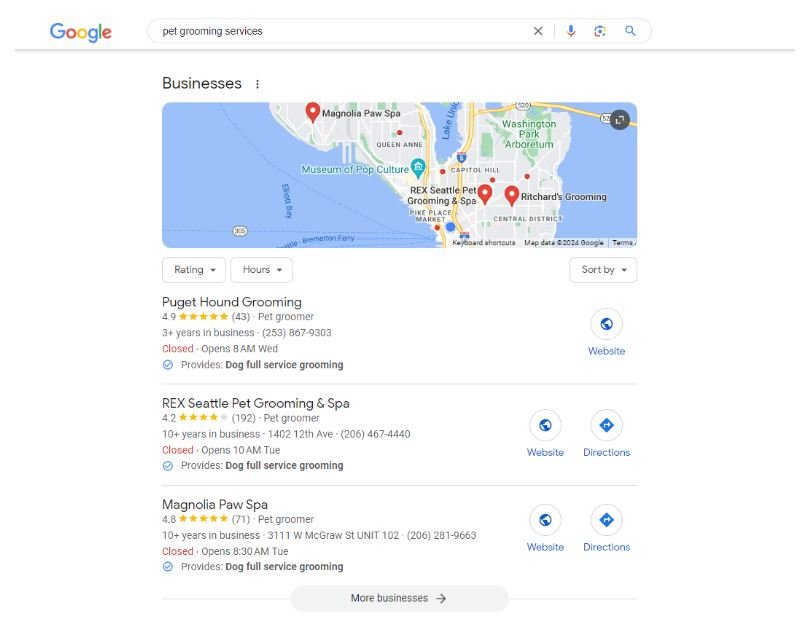
Overall, Google’s local ranking algorithm aims to provide users with the most relevant, convenient, and reputable businesses based on their search queries, location, and prominence factors.
In Whitespark’s 2023 survey on local search ranking factors, insights from 44 local SEO experts were gathered to identify the key elements they consider crucial for ranking in Google’s local pack and organic local results. The survey encompassed 149 potential factors, and experts were tasked with ranking them by importance.
For the local pack, the survey highlighted the following as the most significant factors:
On the other hand, for local organic results, the survey identified these factors as the most influential:
This survey offers valuable insights into the perspectives of local SEO experts and sheds light on the critical factors they believe contribute to ranking success in both Google’s local pack and organic search results.
Now that we have identified the Google Ranking Criteria and local search ranking factors let’s explore some actionable strategies to improve your listing’s visibility:
One crucial step in optimizing your Google Business Profile (GBP) is to create and claim your listing. When creating your listing, it’s important to choose a name that accurately reflects your business’s real-world identity.
Your business name should be consistent with what customers see on your storefront, website, stationery, and what they recognize when interacting with your business.
Google Business Profile Help
Include additional information such as your address, service area, business hours, and category in their respective sections. For instance, if you’re creating a GBP for a 24-hour gym named “Sunrise Gym” located in downtown Los Angeles, your business information would look something like this:
While it’s important to include relevant keywords in your business name to improve visibility in search results, it’s crucial to adhere to Google’s name policy to avoid any penalties or suspension of your GBP. Adding unnecessary information or violating Google’s guidelines could lead to adverse consequences.
For example, here are some guidelines and examples to consider when choosing your business name:
While it’s tempting to include additional information or keywords in your business name, it’s essential to prioritize accuracy and adherence to Google’s policies to maintain the integrity of your GBP. By claiming and verifying your GBP listing, you gain full control over its content and ensure that it accurately represents your business to potential customers.
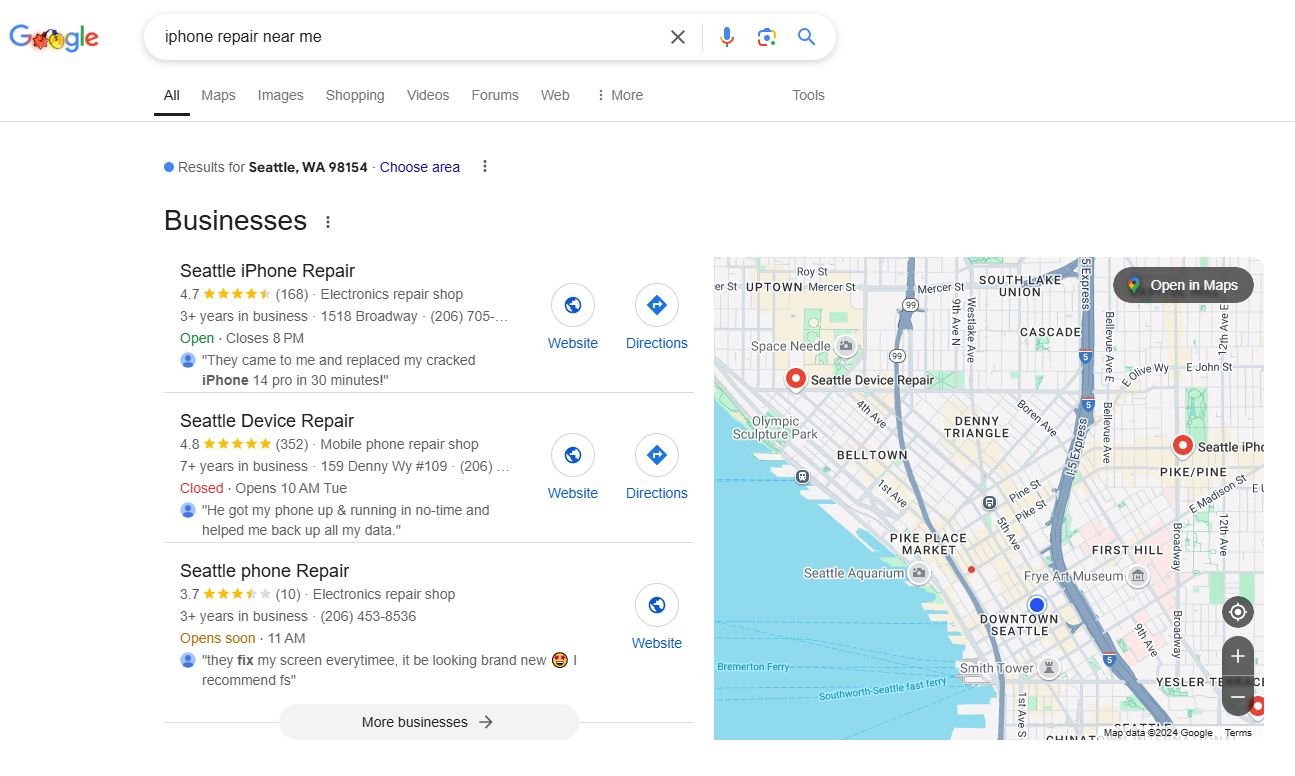
Choosing the primary category for your Google My Business (GMB) listing is a critical step in optimizing your online presence. This primary category serves as a fundamental descriptor of your business’s main offering, enabling Google to comprehend the nature of your business accurately. It plays a pivotal role in determining where your business appears in local search results, directly impacting its visibility to potential customers searching for relevant products or services in your area.
By selecting the most appropriate primary category that aligns closely with your business’s core offerings, you provide Google with valuable information to match your listing with relevant search queries. For example, if you operate a bakery, selecting “Bakery” as your primary category ensures that your listing appears in search results when users search for terms related to bakeries in your locality.
Additionally, the primary category is one of the factors considered by Google in local search ranking algorithms. Businesses that accurately categorize themselves are more likely to rank higher in local search results, increasing their visibility and attracting more potential customers.
Furthermore, it’s worth mentioning the importance of additional categories in your GMB listing. While the primary category carries the most weight in determining relevance and ranking, adding additional categories can provide further context about the breadth of your business’s offerings. These secondary categories allow you to highlight additional products or services your business provides, making it easier for users to find you in relevant searches.
For instance, a bakery may choose “Wedding Cakes” or “Custom Cupcakes” as additional categories to showcase specific services they offer apart from their primary category of “Bakery.”
Selecting the correct primary category for your GMB listing is crucial for enhancing visibility in local search results and improving your business’s chances of ranking higher. While additional categories may not carry as much weight as the primary category, they still play a role in providing comprehensive information about your business to potential customers. Therefore, ensuring accuracy and relevance in both primary and additional categories can positively impact your business’s online presence and local search ranking.

In optimizing your Google Business Profile (GBP) for maximum visibility, ensuring the accuracy and prominence of your business’s physical address is paramount. This includes both the presence of a physical address within the city being searched and the proper placement of the map pin.
Google emphasizes local relevance in its search results, prioritizing businesses with physical addresses located within the city or area specified in the user’s search query. Therefore, it’s essential to ensure that your GBP accurately reflects your business’s location, particularly if you’re targeting customers in a specific city or locality. Including the full and correct address within the city of search enhances your business’s eligibility to appear in local search results for users seeking nearby products or services.
Alongside providing the correct address details, placing the map pin accurately on the map within your GBP further reinforces your business’s geographical relevance. The map pin serves as a visual indicator of your business’s location to users and helps them gauge proximity to your establishment. It’s crucial to ensure that the map pin is positioned precisely at your business’s physical location, avoiding any discrepancies or misplacements that could confuse potential customers. A correctly placed map pin not only enhances user experience but also signals to Google the precise geographical area your business serves, improving its chances of appearing prominently in local search results.
Ensuring the presence of a physical address within the city of search and accurately placing the map pin on the map strengthens your business’s local presence, making it more accessible to potential customers searching for products or services in your area.

Ensuring the completeness of your Google Business Profile (GBP) is not just about checking off boxes—it’s about maximizing your online visibility and attracting potential customers to your business. As the digital storefront for your enterprise, your GBP serves as a crucial touchpoint for users searching for products or services like yours. Studies by Google reveal compelling statistics: the average business garners 1,260 monthly views through their GBP, highlighting its significance as a prime platform for customer engagement. Moreover, data indicates that businesses with complete profiles are 70% more likely to receive visits from users, and 50% more likely to convert those visits into purchases. These statistics underscore the importance of optimizing your GBP for completeness to enhance your visibility and drive tangible business results.
A complete GBP listing provides users with comprehensive information about your business, making it easier for them to make informed decisions. Here’s how to ensure completeness:
Business Information: Start by providing accurate and up-to-date details about your business, including the name, address, phone number (NAP), website URL, and business hours. Consistency across all platforms is key to building trust with potential customers and improving your local search ranking.
2. Description & Opening Date: Craft a compelling business description that effectively communicates your unique value proposition, products, or services. Use relevant keywords strategically to enhance your visibility in search results and attract your target audience. Also, add your business opening date.
3. Photos and Videos: Visual content is incredibly impactful in shaping users’ perceptions of your business. Upload high-quality photos and videos showcasing your products, services, team members, and the ambiance of your establishment. Including a variety of images can help users visualize their experience with your business and increase engagement.
4. Additional Information: Take advantage of additional features offered by Google My Business, such as adding attributes, service menus, and frequently asked questions (FAQs). Providing detailed information about your offerings can help users understand the full scope of your business and make informed choices.
By ensuring completeness in your GBP listing, you not only enhance your visibility in local search results but also create a positive impression on potential customers, increasing the likelihood of conversions and long-term success for your business.
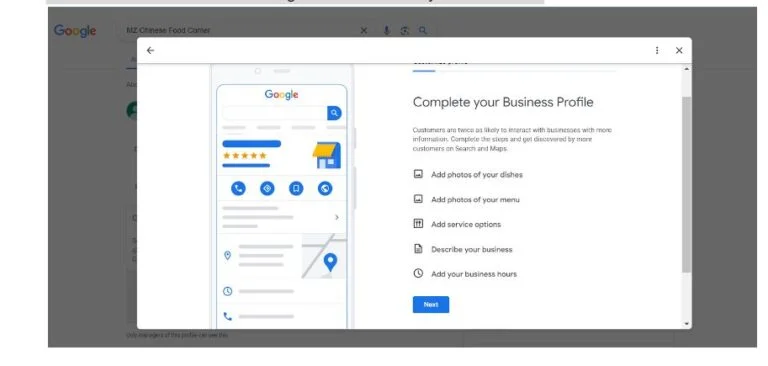
Positive reviews play a crucial role in improving the ranking and reputation of a business on Google Business Profile (GBP). According to recent surveys, a staggering 71% of respondents stated that positive reviews on Google My Business (GMB) made them more inclined to use a particular business. This statistic underscores the significant influence that positive reviews wield in shaping consumer perceptions and driving business success.
Encouraging positive reviews is essential for businesses looking to improve their Google My Business ranking and attract more customers. Here are some strategies to encourage positive reviews:
Provide excellent products or services: Delivering exceptional quality products or services is the foundation for earning positive reviews and ratings. Satisfied customers are more likely to leave glowing reviews about their positive experiences, thereby bolstering your business’s reputation.
Promptly request reviews and ratings: After completing a transaction or providing a service, promptly request feedback from your customers. Consider sending follow-up emails or messages thanking them for their patronage and kindly asking them to share their experience by leaving a review on your GMB listing.
Make it easy to leave reviews: Simplify the review process for your customers by providing clear instructions on how to leave a review on Google. Include direct links to your GMB listing in email signatures, invoices, or follow-up communication to streamline the review submission process.
Incentivize reviews cautiously: While offering incentives such as discounts or freebies in exchange for reviews may seem enticing, it’s crucial to adhere to Google’s guidelines and avoid incentivizing reviews explicitly. Instead, focus on providing exceptional service that naturally motivates customers to share positive feedback.
Engage with reviewers: Actively engage with customers who leave reviews on your GMB listing. Respond promptly to both positive and negative reviews, expressing gratitude for positive feedback and addressing concerns raised in negative reviews. Demonstrating responsiveness and a commitment to customer satisfaction can enhance your business’s reputation and encourage more positive reviews.
In addition to encouraging positive reviews, effectively managing negative reviews is equally important for maintaining a favorable online reputation. Here are some strategies for managing negative reviews:
Respond promptly and professionally: Address negative reviews promptly and professionally by acknowledging the customer’s concerns and expressing a sincere desire to resolve the issue. Avoid becoming defensive or engaging in arguments, as this can further escalate the situation.
Take the conversation offline: Whenever possible, offer to take the conversation offline to address the customer’s concerns privately. Provide contact information or invite the customer to reach out directly to discuss their issues in more detail and find a resolution.
Learn from feedback: Use negative reviews as an opportunity to identify areas for improvement and enhance your products or services. Take constructive criticism seriously and use it to implement positive changes that can prevent similar issues from arising in the future.
Encourage more positive reviews: Counterbalance negative reviews by actively encouraging more positive feedback from satisfied customers. By increasing the volume of positive reviews, you can mitigate the impact of negative feedback on your business’s overall reputation.
By implementing these strategies, businesses can effectively leverage positive reviews to improve their GBP ranking, attract more customers, and foster a positive online reputation. Additionally, adeptly managing negative reviews demonstrates a commitment to customer satisfaction and can help mitigate the impact of unfavorable feedback on your business’s reputation.
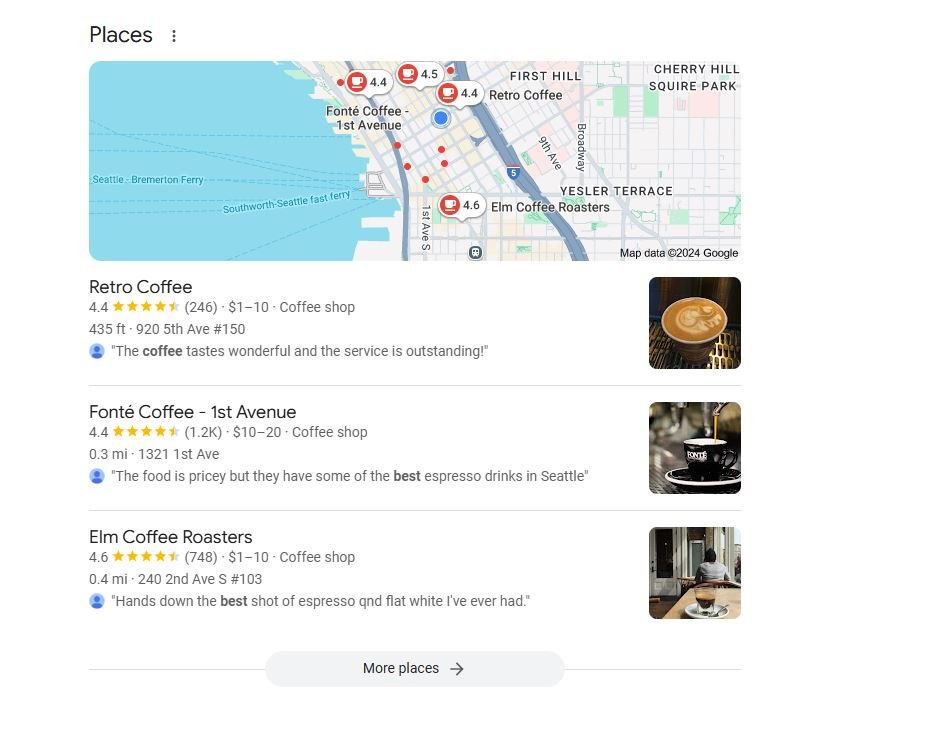
Adding high-quality photos and videos to your Google Business Profile (GBP) can have a significant impact on both customer engagement and your profile’s ranking in search results. Research shows that GBP listings with photos are twice as likely to be perceived as reputable by Google and receive about 35% more clicks compared to listings without photos.
High-quality visuals not only enhance the aesthetic appeal of your GBP but also provide valuable information to potential customers. Here’s how photos and videos contribute to customer engagement and GBP ranking improvement:
Improved Visibility and Reputation: Including photos and videos in your GBP makes it more visually appealing and stands out among competitors in search results. When users see visually attractive listings, they are more likely to click on them, leading to increased visibility for your business. Moreover, Google perceives listings with photos as more reputable, which can positively influence your profile’s ranking.
Enhanced Customer Experience: Photos and videos help users gain a better understanding of your business, products, and services. By showcasing multiple facets of your business, such as the interior, exterior, products, and staff, you provide potential customers with a virtual tour and a glimpse of what to expect when they visit. This transparency and visual representation can make users more comfortable and confident in choosing your business.
Brand Recognition and Trust: High-quality visuals help consumers recognize your brand both online and offline. Consistent branding elements such as logos and color schemes in your photos and videos reinforce brand identity and make your business more memorable to customers. Additionally, seeing images of happy customers interacting with your staff builds trust and credibility, encouraging others to engage with your business.
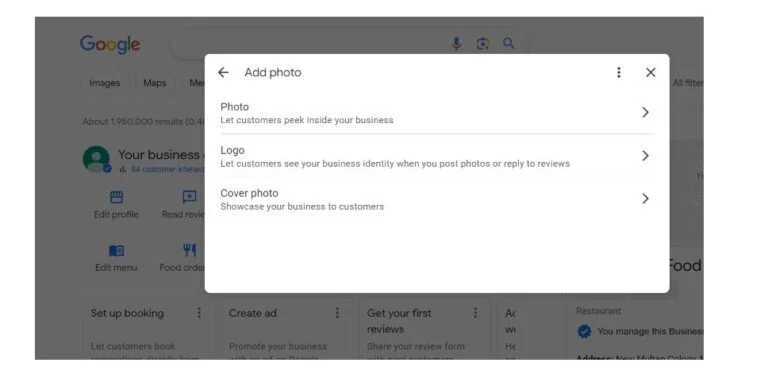
Adding high-quality photos and videos to your Google Business Profile not only enhances the customer experience but also contributes to improved visibility, reputation, and ranking in search results. By showcasing the unique aspects of your business through compelling visuals, you can attract more customers, drive purchasing decisions, and ultimately strengthen your online presence.
Managing business listings and directories plays a crucial role in improving Google Business Profile (GBP) ranking and overall online visibility. Let’s delve into each aspect in detail:
Consistently updating and optimizing your business listings across various online directories, including Google My Business, enhances your online presence and increases your chances of ranking higher in local search results. According to a study by Brightlocal, A top ranking local business has approximately 81 citations from top-level domains.
Regularly updating your GBP with relevant information, such as business hours, services offered, contact details, and photos, helps Google understand your business better and improves its visibility in local search results. Managing and responding to customer reviews on platforms like Google My Business not only enhances your online reputation but also signals to Google that your business is actively engaged with its customers, potentially boosting your GBP ranking.
NAP consistency refers to ensuring that your business’s name, address, and phone number (NAP) are consistent across all online directories and platforms. Inconsistencies in NAP information can confuse search engines and users, leading to a drop in local search rankings and credibility. Maintaining consistent NAP information across directories helps Google validate the authenticity and trustworthiness of your business, leading to improved GBP ranking and better visibility in local search results.
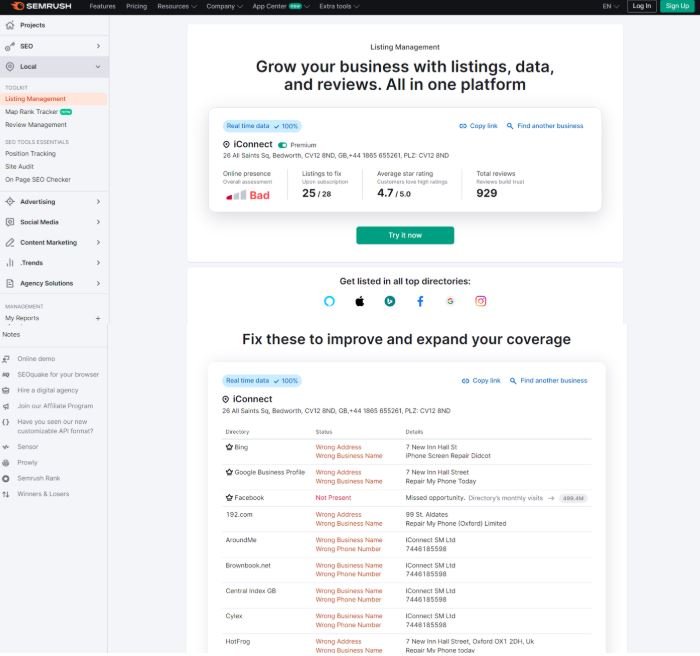
Spam listings, which include duplicate, fake, or misleading business profiles, can negatively impact your GBP ranking and credibility. Google’s algorithms prioritize authentic and high-quality listings, so removing spam listings can help improve your GBP ranking and visibility. According to research by BrightLocal, 64% of consumers have encountered incorrect business information online, indicating the prevalence of spam listings and the importance of combating them. Regularly monitoring and reporting spam listings to Google helps maintain the integrity of local search results and ensures that legitimate businesses receive fair visibility and ranking.
Managing business listings and directories effectively by ensuring NAP consistency, removing spam listings, and regularly updating and optimizing your GBP can significantly contribute to improving your local search ranking, attracting more potential customers, and enhancing your online reputation.
By linking your website to your GMB profile and strategically incorporating keywords into your landing page title, you can significantly improve your GMB ranking and increase your business’s exposure in local search results.
Linking your website to your Google My Business profile is a simple yet effective way to strengthen your online presence and improve your GMB ranking. When you link your website to your GMB profile, you provide Google with additional information about your business, which helps improve its relevance and credibility in local search results.
By linking your website to your GMB profile, you not only provide users with easy access to more information about your business but also signal to Google that your business is legitimate and trustworthy, which can positively impact your GMB ranking.
In addition to linking your website to your GMB profile, optimizing your landing page title with relevant keywords is another crucial step in improving your GMB ranking. The landing page title is the first thing users see when they click on your GMB listing, making it a prime opportunity to capture their attention and communicate the essence of your business.
Here are some tips for incorporating keywords into your GMB landing page title:
By optimizing your landing page title with relevant keywords, you increase the likelihood of your GMB listing appearing in local search results for relevant queries. This, combined with linking your website to your GMB profile, can help boost your GMB ranking and drive more traffic to your business.
Ensuring your website is mobile-friendly isn’t just about user experience—it’s crucial for ranking in local organic search results. With the shift towards mobile-first indexing by search engines like Google, prioritizing mobile optimization has become paramount. Considering that a substantial portion of web traffic originates from mobile devices, neglecting mobile optimization means potentially missing out on a large audience. By adopting a mobile-first approach and optimizing your website for various screen sizes and devices, you not only enhance user experience but also increase your chances of ranking higher in local organic search results. So, invest in responsive design, ensure fast loading times, and prioritize mobile usability to stay ahead in the competitive digital landscape and capture the attention of mobile users in your local market.
To optimize your website for local organic results, it’s crucial to create dedicated pages for each service you offer. By crafting individual pages, you not only enhance the user experience by providing detailed information but also improve your chances of ranking higher in local searches. Each service page acts as a gateway for potential customers to discover what you specialize in and how you can meet their needs. These pages should be meticulously structured with relevant keywords, informative content, internal linking and clear calls-to-action to encourage engagement and conversions. By tailoring each page to a specific service, you increase the likelihood of attracting qualified leads and establishing your website as a valuable resource in your local community.
To effectively boost your website’s visibility and ranking in local organic search results, implementing a comprehensive internal linking strategy across your entire website is paramount. Internal linking not only enhances user experience by guiding visitors to relevant content but also signals to search engines the importance and hierarchy of various pages within your site. By strategically interlinking pages with relevant anchor text containing local keywords, such as location names or service offerings, you can optimize your site’s structure for local search queries. Additionally, creating cornerstone content pages that serve as hubs for specific local topics or services and linking them to related articles or landing pages can further bolster your site’s authority and relevance in local searches. Consistent and strategic internal linking not only improves navigation but also helps search engines understand the context and relevance of your content, ultimately contributing to higher rankings in local organic search results.
Optimizing your Google My Business listing is crucial for improving your online visibility and attracting more customers to your business. By focusing on relevance, proximity, prominence, and user engagement, you can enhance your GMB ranking and stand out in local search results. Implement the strategies outlined in this guide consistently, and monitor your progress to achieve long-term success in the digital landscape. Remember, a well-optimized GMB listing not only drives more traffic to your business but also enhances your overall online reputation and credibility.

